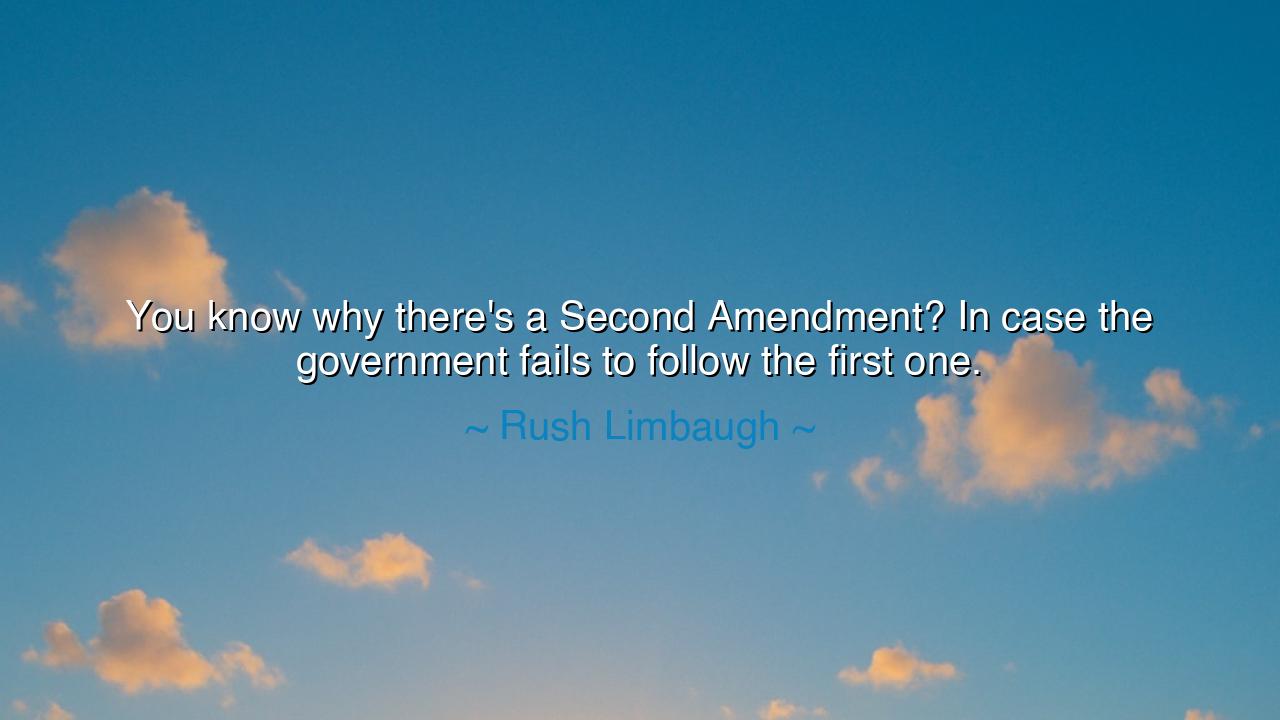
You know why there's a Second Amendment? In case the government
You know why there's a Second Amendment? In case the government fails to follow the first one.






In the words of Rush Limbaugh, the saying rings through the ages: “You know why there's a Second Amendment? In case the government fails to follow the First one.” These words, sharp as a sword and heavy as a bell toll, remind the people of the ancient covenant between the rulers and the ruled. The First Amendment promises the voice of the people—their right to speak, worship, assemble, and petition without fear. But the Second Amendment, that iron guardian, stands behind it—not as a threat, but as a solemn vow that liberty shall not fall silent by force. For when speech is forbidden and thought is chained, the hand must remember its strength.
In the old days, the founders of the Republic had felt the weight of tyranny pressing upon their necks. They knew too well the peril of unarmed truth before armed power. Thus they wrote into the bones of their new nation a covenant—one amendment to safeguard the soul, and another to safeguard the body. The First was the song of freedom; the Second, the shield against silence. These two are twins in the spirit of liberty: the one speaks so the people may be heard, the other stands ready that the people may remain free.
History bears witness to the wisdom of this bond. Recall the fires of Concord and Lexington, when farmers and blacksmiths, their hearts trembling but resolute, took up arms not for conquest but for voice. The British crown had sought to seize their powder and muskets—to silence their assembly, to bend their will. Yet those common folk stood their ground, not as soldiers, but as men who understood that without defense, their words would soon be ashes in the wind. Thus was born the defiance that birthed a nation—the knowledge that freedom unguarded is but a dream waiting to be taken.
And so, Rush Limbaugh’s words do not speak merely of weapons or war—they speak of responsibility. For the right to bear arms is not the call to violence, but the reminder that liberty is fragile, and that the people themselves are its keepers. When he says, “in case the government fails to follow the first one,” he warns that corruption begins not with the sword, but with the silencing of speech, the censorship of conscience, the slow decay of courage. And when that hour comes, he says, the spirit of the people must be ready—not for rebellion, but for remembrance of what freedom costs.
Let us think, too, of the great dissidents of the world—those whose words shook empires even without a rifle. Men like Solzhenitsyn, who, stripped of all but his truth, revealed to the world the horror of a silenced people. He had no Second Amendment to guard him, no nation of arms to stand behind him, and thus his words were nearly lost to the gulags. His story is a mirror of what happens when only the first right is written, and not the second. His suffering whispers across time: “Guard your liberty not only with words, but with will.”
The lesson, then, is clear and enduring: the strength of a free people is not in their government, but in their spirit—and that spirit must be both wise and watchful. A nation that loves peace must still be prepared to defend it. For freedom unguarded becomes freedom undone, and history shows that silence is the first chain of the enslaved. Therefore, honor both amendments as one sacred promise: to speak with courage, and to stand with resolve.
In our own lives, this teaching takes form not in muskets or militias, but in vigilance, education, and courage. Speak truth even when it trembles on your lips. Defend the right of others to do the same, even when their words are not your own. And when power grows proud and deaf to the people’s voice, remember that you are the final guardian of your own freedom. For liberty is not given—it is kept, and its keeping demands the heart of a warrior and the soul of a poet.






AAdministratorAdministrator
Welcome, honored guests. Please leave a comment, we will respond soon